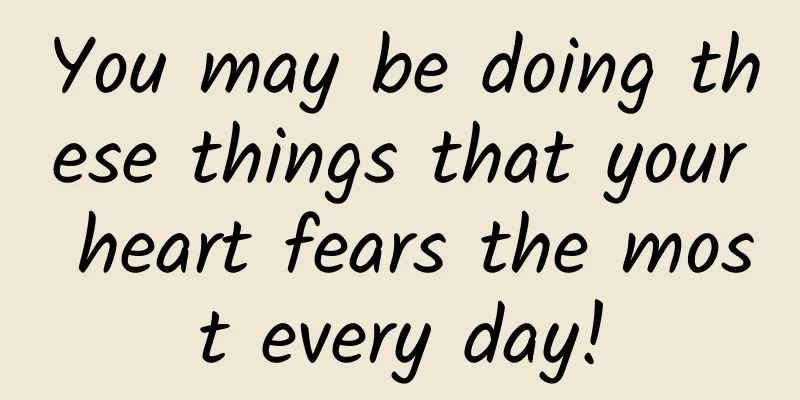You may be doing these things that your heart fears the most every day!

|
The heart pumps blood continuously to deliver oxygen and nutrients to the whole body, maintaining the normal functioning of various organs. It looks strong, but it is very fragile. Studies show that 70% to 80% of sudden deaths are related to the heart. In fact, sudden death is not far away. Those lifestyle habits that we ignore may gradually induce the most dangerous moment over time. These lifestyle habits often lead to sudden cardiac death. Check if you have similar problems. These lifestyle habits can easily lead to sudden death 1. Excessive and irregular eating Overeating will put too much burden on the gastrointestinal tract, forcing the heart to work in overload, which can easily lead to myocardial ischemia. Fried foods contain a lot of fat, which increases blood lipid levels and can easily cause arterial plaques, blood clots, and even myocardial infarction. Excessive drinking can increase heart rate and blood pressure, thereby inducing arrhythmia. Obesity can significantly increase the risk of coronary heart disease, which is one of the important causes of sudden death. 2. Straining too hard during bowel movements When you strain to defecate, abdominal pressure will suddenly increase, causing blood pressure to rise rapidly, increasing the burden on the heart and possibly inducing angina pectoris, myocardial infarction or malignant arrhythmia. 3. Too much pressure Long-term overtime work or being in a state of excessive tension or excitement will cause the sympathetic nerves to remain excited, resulting in the secretion of large amounts of vasoactive substances, blood vessel constriction, and increased blood pressure. The heart and blood vessels will be easily damaged, and the risk of myocardial infarction will also increase. 4. Taking a bath with water that is too hot for a long time Water temperature that is too high will accelerate blood circulation in the body and cause abnormal heart rate; bathing for too long or in a closed environment may also cause chest tightness, palpitations and other discomforts. It is recommended that the water temperature be controlled at 35-38℃ and the bathing time should not exceed 20 minutes. Especially for the elderly, it is best to have someone to assist them when bathing. 5. Vigorous exercise Vigorous exercise may cause a sudden rise in blood pressure, excessive heart rate, insufficient blood supply to the myocardium, and more easily induce myocardial infarction. For middle-aged and elderly people, it is advisable to choose gentle aerobic exercise, such as brisk walking and jogging, and the time should not exceed 1 hour. Once chest tightness, shortness of breath and other discomforts occur, they should stop immediately and rest. 6. Extreme Emotions When you are extremely sad or angry, you may experience symptoms of "broken heart syndrome" such as chest pain, shortness of breath, and chest tightness, which can endanger your heart health. 7. Sitting for a long time Spending long hours at a desk or staring at the TV or mobile phone slows down blood flow and makes it easy for blood clots to form. Once a blood clot breaks off, it blocks the brain, heart and lung blood vessels, which may lead to sudden death. 6 good habits to protect your heart In order to keep the heart pumping blood to the whole body continuously and powerfully, you must know its preferences. Adhering to 6 good habits in life can help maintain a healthy heart. 1. Eat a balanced diet and control salt intake Eat more fruits and vegetables and whole grains. Eat at least 1 pound of vegetables and half a pound of fruits every day; add appropriate amounts of buckwheat, red beans, etc. to rice and white flour, or replace some staple foods with potatoes and corn. Take in enough protein. Eat more white meat such as fish and chicken, and less red meat such as pork; increase the amount of eggs, milk and soy products. Control salt intake to no more than 5 grams per day. 2. Get enough sleep Studies have shown that if you sleep less than 7 hours, the risk of heart disease and stroke will increase. Adults should generally ensure 7 to 8 hours of sleep, and the elderly also need to ensure 5 to 6 hours. 3. Exercise moderately Aerobic exercise can make the heart more active, such as jogging, swimming, Tai Chi, yoga, etc. It is recommended to exercise for 30 minutes a day, at least 3 times a week, avoid sitting for long periods of time, and get up and move for 3 to 5 minutes every hour of sitting. The heart rate during exercise should not exceed 20% of the basic heart rate, and it is recommended to control it at around 120 beats per minute. 4. Drink 8 glasses of water every day Adults need 1500-1700 ml of water per day, about 8 cups (200 ml per cup). Heart patients should drink small amounts of water frequently; those with renal insufficiency should drink less water appropriately. 5. Quit smoking and limit alcohol consumption Whether active or passive smoking, it will increase the risk of inflammation, thrombosis, etc., and seriously damage cardiovascular health. Alcohol is also not good for the cardiovascular and cerebrovascular systems. The daily alcohol intake for men should be less than 25 grams, for women less than 15 grams, and not more than 100 grams per week. 6. Maintain a positive attitude Being under stress for a long time will increase the levels of hormones such as cortisol and adrenaline in the body, causing high blood pressure and faster heart rate. Deep breathing, meditation and other methods can relieve emotions and reduce the secretion of stress hormones. Recognizing danger signs from your heart The scary thing about heart disease is its suddenness and unpredictability. You need to be vigilant when you experience the following discomforts. 1. Chest tightness and chest pain If you suddenly experience chest tightness or chest pain and cannot be relieved, or if it is not persistent but occurs frequently, you should be alert to the signs of a heart attack. 2. Stomach discomfort without any cause Heart problems do not necessarily manifest themselves only as chest pain. Symptoms such as sweating, nausea, vomiting, and stomach discomfort may also occur. Further medical examination should be sought. 3. Darkness in front of eyes If there is a brief visual blackout or even loss of consciousness, especially if there is a history of coronary heart disease, cardiomyopathy, etc., you should pay close attention and seek medical attention promptly. 4. Palpitations, shortness of breath or fatigue If these symptoms occur after a respiratory or digestive tract infection, you need to be alert to whether myocarditis is present; if similar symptoms occur after recent overwork or heavy smoking, you should also seek medical attention as soon as possible. In addition, changes in the heart are also reflected in body surface signals: Earlobe crease: The earlobe is rich in capillaries. If the blood vessels are hardened and blood circulation is poor, obvious creases will easily appear on the earlobe. Neck circumference becomes thicker: When the neck circumference of men is >39 cm and that of women is >35 cm, it often indicates that blood pressure, blood lipids, blood sugar and other indicators are high, which may increase the risk of heart disease. Pulse disorder: A normal pulse is 60 to 100 beats per minute with a regular rhythm. A pulse that is too fast, too slow, or has a disordered rhythm may be a sign of heart disease. Ankle edema: If unexplained edema still occurs after excluding the factors of standing or sitting for a long time, you should be alert to heart failure or chronic heart disease. Cold toes: If your feet are still cold even in a warm environment, it indicates a problem with blood circulation, the root cause of which is probably in the heart. Producer: Li Zhe Editor-in-Chief: Wang Xuan Editor: Qin Jing Review Expert | Zhang Haitao, Chief Physician of the Department of Critical Care Medicine, Oriental Hospital Affiliated to Tongji University |
Recommend
Serialize the Intent and pass it like a Uri!!!
[[207121]] 1. Do you really need to create a new ...
[Case] How does an e-commerce app develop an operation and promotion strategy from scratch?
Through this article, you can learn how to formul...
Revealed | The 6 major Internet profit models (with Meituan Waimai and Mobike cases)
On April 3, Mobike was sold to Meituan for US$3.7...
Brand Marketing Secrets for Generation Z
Generation Z refers to people born between 1995 a...
Why is paraquat poisoning so terrible? Is there really no cure after drinking paraquat?
Key Points ★ Most people who are poisoned by para...
The United States boycotts Huawei, but the iPhone is selling well in the country. Why can't we reject Apple?
Now we finally have Huawei that can compete with ...
World Obesity Day丨"Puffy" or Strong, which type of obesity are you?
May 11 is the annual World Obesity Day. The homon...
An effective method for building an APP user system!
We must be clear that building a user growth syst...
Based on the current situation of the community, let’s talk about how we operate the community?
To operate a community well, the key is to find t...
How much does it cost to customize the Tai'an Gardening Mini Program? Taian Gardening Mini Program Customized Price Inquiry
How much does it cost to customize the Tai'an...
How to make your product a TikTok celebrity?
Many foreign trade advertisers say that they want...
With the same 4GB of memory, why can the iPhone be used smoothly for 5 years, but Android cannot?
Looking back at some of my friends around me, unt...
The reason why we can’t eat “state banquet dishes” is because the ingredients are too “abnormal”?
The state banquet dish "Shangri-La Conch in ...
What are the characteristics and trends of online education apps in market launch?
With the maturity of mobile Internet technology, ...
Can iOS14.5 protect your privacy?
Introduction Do you often feel that when you ment...









